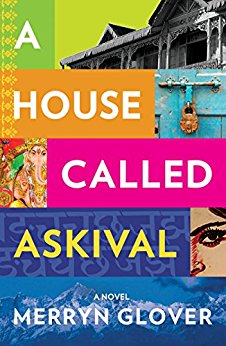Although I’ve travelled the world from Antarctica and Australia to Zanzibar and Zambia I am desperate to visit India, so I’m thrilled that, until my planned trip next year, I can visit vicariously through a fabulous guest post by Merryn Glover, author of A House Called Askival. Merryn writes so evocatively about Mussoorie that I’m there already!
A House Called Askival is available for purchase here.
A House Called Askival

James Connor is a man who, burdened with guilt following a tragic event in his youth, has dedicated his life to serving India. Ruth Connor is his estranged daughter who, as a teenager, always knew she came second to her parents’ missionary vocation and rebelled, with equally tragic consequences.
After 24 years away, Ruth finally returns to Askival, the family home in Mussoorie, a remote hill station in the Northern State of Uttarakhand, to tend to her dying father. There she must face the past and confront her own burden of guilt if she is to cross the chasm that has grown between them.
In this extraordinary and assured debut, Merryn Glover draws on her own upbringing as a child of missionary parents in Uttarakhand to create this sensitive, complex, moving and epic journey through the sights, sounds and often violent history of India from Partition to the present day.
Mussoorie
A Guest Post by Merry Glover
When I decided it was time to fulfil a life-long dream and write my first novel, I knew immediately where I wanted it set: Mussoorie, a hill-station in the Himalayan foothills of North India. It was where I attended boarding school for nine years, becoming a significant home base that I still visit whenever I can. Quite apart from my own history, it is story gold.

Askival Site
Scattered across a steep range at roughly 7000 feet, the busy town started life as a handful of shepherds’ huts in deep forest. During the British Raj, that hill area was seized by the feisty warriors of Nepal, triggering the Gurkha wars that saw the British in the undignified position of needing a large army and several canons to defeat a far smaller force with little more than knives, superior mountain skills and their legendary courage. The upshot was that the Gurkhas returned the land, resisted colonisation and won everlasting respect, being recruited into the British army to this day. The military men who led the victory were given land on the ridge for hunting lodges and thus, in the 1820s, the hill station of Mussoorie was born.
Hill stations developed across India because the high altitudes gave the British an escape from the heat, mosquitoes, crowds and diseases of the plains. They were ideal locations for hospitals, boarding schools and military cantonments and even the whole government of British India, which moved to Simla every summer. And they rapidly became popular holiday destinations, swelling during ‘The Season’ and filling the growing number of hotels, cinemas, ballrooms, shops and skating rinks that sprung up on the steep slopes. At their height, hill-stations teemed with the serried ranks of the Raj, taking tea on their balconies, cavorting at themed dances or parading down the Mall, often in hand-drawn rikshaws. What’s more, with deep forests, cool air, rain and mist, the hill stations were rather like home and nostalgia abounded. Houses were named Scotsburn and Tipperary, Strawberry Cottage and Ivy Bank, and in Mussoorie, a whole string were named after Sir Walter Scott novels: Waverley, Ivanhoe, Kenilworth and Woodstock, which became my boarding school.
Like much of British India at the time, it was a largely segregated world, with only Maharajas and their ilk getting a foot-hold on the social and property ladders, while most Indians serviced the enterprise. All of this was upended with the coming of Independence in August 1947 and the departure of the colonial powers. Since then, Mussoorie has grown and changed and is now as popular with the new Indian middle-classes as it was with the British, though it still carries many vestiges of the Raj in the stone bungalows, the boarding schools, the cemeteries and old shops, and in the quaint traditions still fiercely upheld by older residents, ex-pat and Indian alike. I love discovering remnants of this bygone world: the crumbling grandeur of the Savoy Hotel where a moth-eaten stag glares from one glass eye; an antique shop creaking with Willow-pattern china and rusting snuff boxes; a collection of sepia photographs of ladies in sedan chairs and moustachioed gents trussed up as Egyptians.

Mussoorie in Snow
But what has never changed about Mussoorie is its beauty. Looking south from the hillside, you can see the Dehra Dun plain with the Ganga and Jamuna rivers curving across it like serpents, and looking north, you might see the Himalayas in their jagged splendour. On the hills themselves, the protected forests are cathedrals of life, full of fragrance, wildflowers and small creatures, threaded with the sounds of birds and the wind through pines; and this high up, the air is clear, the sunsets vivid and the nights rich with stars. In the monsoon – a season that inhabits my novel like another character – moss and ferns spring from the ground and tree trunks, and mist moves across the ridges like a brooding spirit.
All of this beauty and history are the stage for A House Called Askival, an epic story spanning 70 years from pre-Independence to the new millennium, through the lives of an American family who, like me, are deeply bonded to Mussoorie and forever changed by it.
(And doesn’t that post make me want to get on the plane to India even more!)
About Merryn Glover

Australian by passport, Merryn Glover was born in a former palace in Kathmandu and brought up in Nepal, India and Pakistan. Her writing has won awards and been published in anthologies, magazines and newspapers and her fiction and drama broadcast on Radio Scotland and Radio 4. A House Called Askival is her first novel and she is currently working on a second, set where she lives in the Highlands of Scotland. Two days a week she works in a high school library where she works hard to get young people and books together. Much of her writing explores themes of culture, identity, belief and belonging.
You can find out more about Merryn on her website, on Facebook, on Goodreads and by following her on Twitter @MerrynGlover.


It’s a brilliant book Linda. As I was reading it I suddenly got a sense that I was actually there in India with the characters.
LikeLiked by 1 person
One to put in my suitcase for my India trip next year I think!
LikeLiked by 1 person
What a fascinating guest post! Not something I’d think to pick up in a bookshop but I’ll definitely be looking out for this book now 🙂
LikeLiked by 1 person
I think it sounds wonderful. Thanks for calling by lovely x
LikeLiked by 1 person
I must avoid your blog for a few days, it’s bad for the bank balance! 😂 Bought 2 books already this week x
LikeLiked by 1 person
That’s what I like to hear – I really have had the privilege of reading some fantastic books this year!
LikeLiked by 1 person
Wow, love the guest post, her background makes me want to inhabit her imagination, thanks for highlighting this author to us Linda, totally love the themes she writes about and the setting, absolutely stunning – synchronistic as I’ve just been talking to my younger sister who was born in India, she’s making her second pilgrimage back to the place she was born in November and hoping to visit me on a round trip. Your post makes me want to go there too!!
LikeLiked by 1 person
Definitely pop this book in your suitcase. I took it when I went to India and it really added another layer and dimension to all the impressions we were gaining as we travelled!!
LikeLiked by 1 person
I loved Merryn’s post too and am even more excited that I’m off to India next year! Thanks for calling by and commenting.
LikeLiked by 1 person
I certainly will Tina – isn’t this an evocative post?
LikeLike
I’ve just bought a copy to send to my sister, so jealous you’re all going there! I want to read this now too, I’m actually reading the classic Train to Pakistan by Khuswant Singh at the moment, in remembrance of all those who lost their lives and homes in the #1947Partition So much history, but such a wonderful part of the world.
LikeLiked by 1 person
Must add that to my TBR! Have you read Where The River Parts by Radhika Swarup? It’s so good https://lindasbookbag.com/2016/02/19/where-the-river-parts-by-radhika-swarup/
LikeLiked by 1 person
Yes, I read that last year too and enjoyed it a lot, I also have ordered Burnt Shadows by Kamila Shamsie, one from her backlist which I think is also set in this period. Ordered Merryn’s book for me too, I hope it arrives before the anniversary date, it’s great that interest is rekindled in her book, I don’t remember it coming out.
LikeLiked by 1 person
It definitely makes me want to get on a plane there! I have a good friend who has now moved home to Mumbai so I have no reason not to visit – in the meantime will live vicariously through this post too!
LikeLiked by 1 person
Oh – I hope you get there Claire. Thanks for calling by and commenting.
LikeLiked by 1 person
Reblogged this on Author Don Massenzio and commented:
Check out this guest post from author Merryn Glover as featured on Linda’s Book Bag blog
LikeLiked by 1 person
Fascinating guest post! Definitely a book to get lost in!
LikeLiked by 1 person
Thanks for calling by Meggy. Much appreciated x
LikeLiked by 1 person
I read this when it came out. Tight, excellent storytelling with thoughtfulness, and humour too. Excellent.
LikeLiked by 1 person
If you enjoyed it Barbara, that’s a fantastic recommendation. Thanks for calling by.
LikeLike
Thank you Linda for this post. I am buying this book as I was born and brought up in Mussoorie. I am a freelance writer, photographer, small time documentary film maker based in Mussoorie. If you want to know more about Mussoorie, please check http://www.mussooriehandbook.com and ‘The Shooting Box’ on YouTube. Please do let me know if I could be of any assistance during your visit to Mussoorie.
LikeLiked by 1 person
Thanks so much for calling by Sanjay. I’ll be certain to check out your site x
LikeLike
I too went to boarding school for most of my childhood and adolescent years (grade 3-12). I often wonder if I would put my own kids in boarding school too. I had a good experience, but not every kid in my school did, so I can understand that can be difficult. Thanks for sharing your perspective. Interestingly I just wrote a post about my experience in boarding school – we must be on similar wavelengths.
LikeLiked by 1 person
Thanks for calling by and taking the time to comment Dawn.
LikeLike